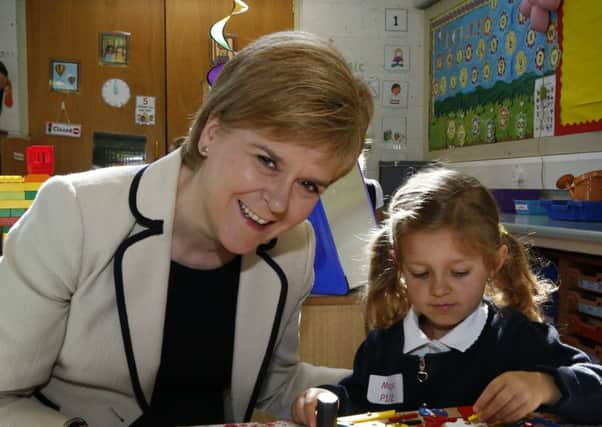Lesley Riddoch: Time to reform Scotland's unloved councils


Scotland’s “local” councils represent bureaucracies as complacent, overlarge and remote from the public as those on Capitol Hill. Indeed worse – Scottish councils are so utterly unloved that a mere 38 per cent of the electorate turned out to vote last time around. In truth, local government here is generally tholed until services become so bad, communities must weigh in to create parallel voluntary structures only to find councils like Argyll and Bute thwarting them every inch of the way.
It’s no surprise communities have bypassed councils to take over abandoned assets like libraries, swimming pools, bus routes and care centres. With no say in the operation of the current dysfunctional system, they have Hobson’s Choice. But the Scottish Government does have power to change things. It can reshape the size, power, funding and electoral system of local government. Why then is Nicola Sturgeon also choosing to bypass our unfit-for-purpose council structure instead of reforming it? And why does talk of reform favour enlarging Europe’s largest councils still further instead of re-creating an additional tier of truly local town, island and rural councils?
Advertisement
Hide AdAdvertisement
Hide AdAcross Europe the average council serves 14k people – in Scotland it’s roughly 170k. In Germany the average council is 15 square kilometres in size – in Scotland it’s 990 square kilometres.
Our local is not local and the absence of grassroots decision-making power is killing our formal democracy, adding to costs, encouraging cynicism and flaring off local energy.
Since local councils were abolished in the 70s, Scotland has had no genuine local democracy – just regional sized bureaucracies trying (and failing) to pass themselves off as local and a plethora of powerless community councils whose average annual budget of £400 per annum must be spent on stationery. This is not a local government system – this is a mess. And COSLA (the umbrella body representing most councils) had the guts to admit that in its Commission for Strengthening Local Democracy which blamed over-large councils for helping “hollow out” Scottish democracy over the last 50 years. The Commission recommended a new structure of more than 100 local councils using a variety of models based on best practice elsewhere. It was published just before the independence referendum in 2014 – bad timing which allowed the Scottish Government to completely ignore it.
Instead, Nicola Sturgeon’s new cabinet has drawn up proposals to strip councils of a wide range of powers; top-slicing council tax cash to create new funds for head-teachers, forcing neighbouring authorities to share services, handing road maintenance to Transport Scotland and bin collections to individual towns.
Advertisement
Hide AdAdvertisement
Hide AdThis comes after the Scottish Government opted to pass on cuts to councils instead of using the new (though admittedly imperfect) Scottish income tax (SRIT) . Similar rate-capping attacks by Margaret Thatcher in the 1980s brought the left out in angry protest and made heroes of Edinburgh District Council leader Alex Wood and Lothian Region’s John Mulvey. Before devolution and before the abolition of relatively local district councils in 1996, cutting their income and powers was viewed by most Scots as an affront to democracy. Yet today the same actions by the Scottish Government have been accepted without public protest. Could that be because our regional-sized “local” councils seem like self-aggrandising mini-parliaments where un-elected officials earn more than the First Minister and seem to compete with Holyrood instead of being small and dynamic enough to connect, deliver and therefore matter to voters?
Since the council tax freeze, the Scottish Government has taken Police, Fire and Rescue services out of council control in the name of efficiency. Then 14 health and social care partnerships were set up to merge budgets and prevent “bed blocking.” There’s a strong suspicion this will form the template for a new system of “local” democracy giving Scots the largest councils in the world and the weakest local democratic control.Despite warm words about “co-production” involving communities in service planning and delivery - as recommended by the late Campbell Christie - money has been sunk into new physical buildings and more superannuated executive jobs whilst power and cash are anchored securely at the top. The “co-producing” grassroots partners, by contrast, are un-funded, un-structured, un-supported and rightly unable to give long term commitments of time and energy as volunteers. In short these co-production “partnerships” have made sure inequality is built in with the bricks. Without debate we can simply expect more of the same.
But debate is not going to happen.
The problem for Scotland’s un-loved councils is that no-one is on their side as the Scottish Government pulls them apart. Opposition parties are scared to put the case for smaller town councils to a council-sceptic public.
But the question Nicola Sturgeon must answer is this. If local government is so unfit for purpose that carefully-crafted work-arounds are needed, where are her plans for sensible reform? Will the SNP restore powerful, budget-raising town, island and rural councils or undermine local democracy with more casual and unaccountable arrangements?
Advertisement
Hide AdAdvertisement
Hide AdThe urgency of this question – just six months before the local elections – has prompted the creation of a new group #OurDemocracy which launches in Glasgow next Monday to kick-start a long overdue debate. Critics, councillors, MSPs, Ministers and voters are most welcome.